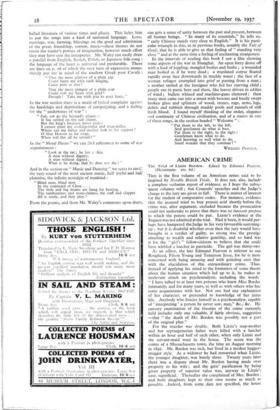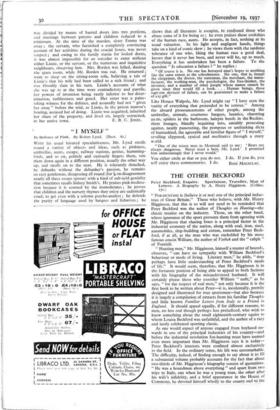AMERICAN CRIME
The Trial of Lizzie Borden. Edited by Edmund Pearson. (Heinemann. xos. 6d.) Tilts is the first volume of an American series said to be inspired by Notable British Trials. It does not, alas, include a complete verbatim report of evidence, as I hope the subse- quent volumes will ; but Counsels' speeches and the Judge's charge to the jury are given in full. There is matter of interest for the student of comparative codes. For instance, evidence that the accused tried to buy prussic acid shortly before the crime was, after argument, excluded because the prosecution could not undertake to prove that there was no innocent purpose to which the poison could be put. Lizzie's evidence at the Inquest was not admitted at the trial. Had it been, it would per- haps have hampered the Judge in his very favourable summing- up ; but it is doubtful whether even then the jury would have brought in a verdict of guilty, so strong was the prestige attaching to wealth and relative gentility, and so hard was it for the " girl's " fellow-citizens to believe that she could have wielded a hatchet in parricide. The girl was thirty-two.
As an editor, the late Edmund Pearson is inferior to out Roughead, Filson Young and Tennyson Jesse, for he is more concerned with being amusing and with grinding axes that with the elucidation of this extraordinary crime. Thus instead of applying his mind to the formation of some theor3 about the human situation which led up to it, he makes ar irrelevant attack on psychoanalysis, including the words " I have talked to at least two persons who knew Miss Border intimately, and for many years, as well as with others who hac some acquaintance with her. Not one had any explanation of her character, or pretended to knowledge of her inner life. Anybody who fancies himself as a psychoanalyst, capable of ' interpreting ' a person he never saw, may," &c.; &c. His cursory examination of the theories of the crime currently held includes only one valuable, if fairly obvious, suggestion —that " the death of Mr. Borden was possibly not a part of the original plan."
For the murder was double. Both Lizzie's step-mother and her septuagenarian father were killed with a hatchet within an hour and half of each other, when only Lizzie and the servant-maid were in the house. The scene was the centre of a Massachusetts town, the time an August morning in 1892. Mr. Borden was rich, but lived in a modest hugger- mugger style. As a widower he had remarried when Lizzie, the younger daughter, was barely three. Twenty years later there was a dispute about Mr. Borden having made over property to his wife ; and the girls' pacification by being given property of superior value was, anyway in Lizzie's case, superficial. Thereafter she complained of Mrs. Borden ; and both daughters kept to their own rooms as much as .possible. Jndfted, from some _date not specified, the house was divided by means of barred _doors into two portions, and meetings between parents and children reduced to a minimum. At the time of the murder, sister Emma was away ; the servant, who furnished a completely convincing account of her activities during the crucial hours, was never. suspect ; and owing to the family mania for locked doors, it was almost impossible for an outsider to enter without either Lizzie, or the servant, or the numerous and inquisitive neighbours, observing him. Mrs. Borden was felled, dusting the spare room, while Mr. Borden was out. He returned ; went to sleep on the sitting-room sofa, believing a tale of Lizzie's that his wife had been called to a sick friend ; and was bloodily slain in his turn. Lizzie's accounts of what she was up to at the time were contradictory and puerile, her powers of invention being vastly inferior to her deter- mination, ruthlessness and greed. Her sister was a pains- taking witness for the defence, and assuredly had not " given her away " before the trial, as Lizzie, in the prison matron's hearing, accused her of doing. Lizzie was acquitted, inherited her share of the property, and lived on, largely ostracised,

















































































































 Previous page
Previous page